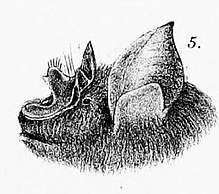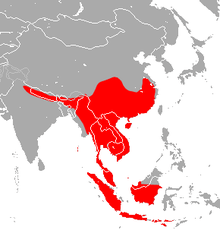Intermediate horseshoe bat
The intermediate horseshoe bat (Rhinolophus affinis) is a bat species of the family Rhinolophidae that is very widespread throughout much of the Indian subcontinent, southern and central China and Southeast Asia.
| Intermediate horseshoe bat | |
|---|---|
 | |
| Scientific classification | |
| Kingdom: | Animalia |
| Phylum: | Chordata |
| Class: | Mammalia |
| Order: | Chiroptera |
| Family: | Rhinolophidae |
| Genus: | Rhinolophus |
| Species: | R. affinis |
| Binomial name | |
| Rhinolophus affinis Horsfield, 1823 | |
| Subspecies | |
|
Nine; see text | |
 | |
| Intermediate Horseshoe bat range | |
It is listed by IUCN as Least Concern as it is considered common where it occurs, without any known major threats.[1]
Taxonomy
The intermediate horseshoe bat was described as a new species in 1823 by American naturalist Thomas Horsfield.[1] The holotype was collected on the Indonesian island of Java.[2]
Rhinolophus affinis is divided into the following nine subspecies:[2]
- R. a. affinis
- R. a. andamanensis
- R. a. hainanus
- R. a. himalayanus
- R. a. macrurus
- R. a. nesites
- R. a. princes
- R. a. superans
- R. a. tener
It varies in appearance and echolocation characteristics throughout its range, suggesting that this taxon may represent a species complex of closely related species.[2]
Description
The intermediate horseshoe bat has a total length of 58–63 mm (2.3–2.5 in), with a forearm length of 46–56 mm (1.8–2.2 in).[3] Individuals weigh approximately 12–15 g (0.42–0.53 oz).[4]
Distribution
The intermediate horseshoe bat is widely distributed throughout Asia, occurring from India and China throughout Southeast Asia.[5] It is found in Bangladesh, Bhutan, Brunei, Cambodia, China, India, Indonesia, Malaysia, Myanmar, Nepal, Thailand, and Vietnam.[1][6] The easternmost extent of its range are the Indonesian Lesser Sunda Islands and Java.[5] It is found at elevations from 290–2,000 m (950–6,560 ft) above sea level.[1]
References
- Walston, J.; Kingston, T. & Hutson, A. M. (2008). "Rhinolophus affinis". The IUCN Red List of Threatened Species. IUCN. 2008: e.T19522A8952553. doi:10.2305/IUCN.UK.2008.RLTS.T19522A8952553.en.
- Ith, Saveng; Bumrungsri, Sara; Furey, Neil M.; Bates, Paul JJ; Wonglapsuwan, Monwadee; Khan, Faisal Ali Anwarali; Thong, Vu Dinh; Soisook, Pipat; Satasook, Chutamas; Thomas, Nikky M. (2015). "Taxonomic implications of geographical variation in Rhinolophus affinis (Chiroptera: Rhinolophidae) in mainland Southeast Asia". Zoological Studies. 54: e31. doi:10.1186/s40555-015-0109-8. PMC 6661434. PMID 31966118.
- Smith, Andrew T.; Xie, Yan, eds. (2013). Mammals of China. Princeton University Press. p. 225. ISBN 9781400846887.
- Bates, Paul J. J.; Thi, Mar Mar; Nwe, Tin; Bu, Si Si Hla; Mie, Khin Mie; Nyo, Nyo; Khaing, Aye Aye; Aye, Nu Nu; Oo, Thida; MacKie, Iain (2004). "A Review of Rhinolophus(Chiroptera: Rhinolophidae) from Myanmar, Including Three Species New to the Country". Acta Chiropterologica. 6: 23–48. doi:10.3161/001.006.0103.
- Maharadatunkamsi; Hisheh, S.; Kitchener, D. J.; Schmitt, L. H. (2000). "Genetic and morphometric diversity in Wallacea: Geographical patterning in the horse shoe bat, Rhinolophus affinis". Journal of Biogeography. 27: 193–201. doi:10.1046/j.1365-2699.2000.00381.x.
- Kingsada, P.; Douangboubpha, B.; Ith, S.; Furey, N.; Soisook, P.; Bumrungsri, S.; Satasook, C.; Vu, D.T.; Csorba, G.; Harrison, D.; et al. (2011). "A checklist of bats from Cambodia, including the first record of the intermediate horseshoe bat Rhinolophus affinis (Chiroptera: Rhinolophidae), with additional information from Thailand and Vietnam" (PDF). Cambodian Journal of Natural History. 2011 (1): 49–59.
External links


- Sound recordings of Rhinolophus affinis on BioAcoustica
